Boris Johnson is very often talked about as a lucky politician, quite often by people who want to point out that his luck has run out.
When Michael Gove turned on him, when he quit as foreign secretary over Theresa May’s Brexit deal, all were apparent denouements for the lucky man. But luck bears down more heavily upon you when you are not in control of events.
That his first prime minister’s questions facing Labour’s new leader Keir Starmer should take place the day after the UK officially recorded the highest coronavirus death toll in Europe, and the second-largest in the world, is nothing to do with luck. It is a direct consequence of his own actions. It didn’t need to be like this.
Download the new Independent Premium app
Sharing the full story, not just the headlines
That the first question he would receive from his new interrogator in chief should end with the justifiably disdainful words, “How did it come to this prime minister?” is also not a matter of luck.
It is certainly not good luck that Johnson looks completely knackered. A week in intensive care followed by a night in the maternity unit is liable to do that to a man.
When asked about his presiding over one of the world’s worst national responses to coronavirus and the staggering, avoidable death toll for which he bears responsibility, would a less exhausted Johnson have thought better than to say that “international comparisons are not always accurate”?
We ask this because Johnson is the key member of the current generation of Tory politicians, the one that has never psychologically left the Oxford Union, which is to say the most malignant generation in our nation’s history, for whom life is all just one big debate.
Would he not have seen what would come next, which would be Starmer holding up one of the government’s own slides, from one of its more than 50 press conferences on consecutive days, in which all it does is compare the scale of the UK’s outbreak to other countries, and quietly pointing out that it “doesn’t hold water” that the day on which the UK’s death toll would become the highest in Europe should also be the day that we must all stop comparing ourselves with other countries.
Scarcely a sentence seems to ever be written about Starmer without mentioning his past as the country’s chief prosecutor, and the fact that there is no shortage of prosecuting now to be done. But backstories and CVs don’t make good politicians. People just have it or they don’t.
Probably, it helped him that the chamber was empty. Detailed, difficult questions could not be blustered away. There was no traditional Tory backbench baboon chorus to be relied upon to rise to the empty chest beating of their chimpanzee leader.
At one point, Johnson just breezily doubled the coronavirus testing target to 200,000 a day by the end of the month. This was in response to the overwhelming evidence that the current target was a PR exercise and fundamentally a joke, so he just issued a new one.
But none of this is to say that Johnson’s luck has run out. Not even close. It’s hardly the case that he is unlucky to have to deal with Starmer, when his predecessor had three comparatively glorious years of Jeremy Corbyn.
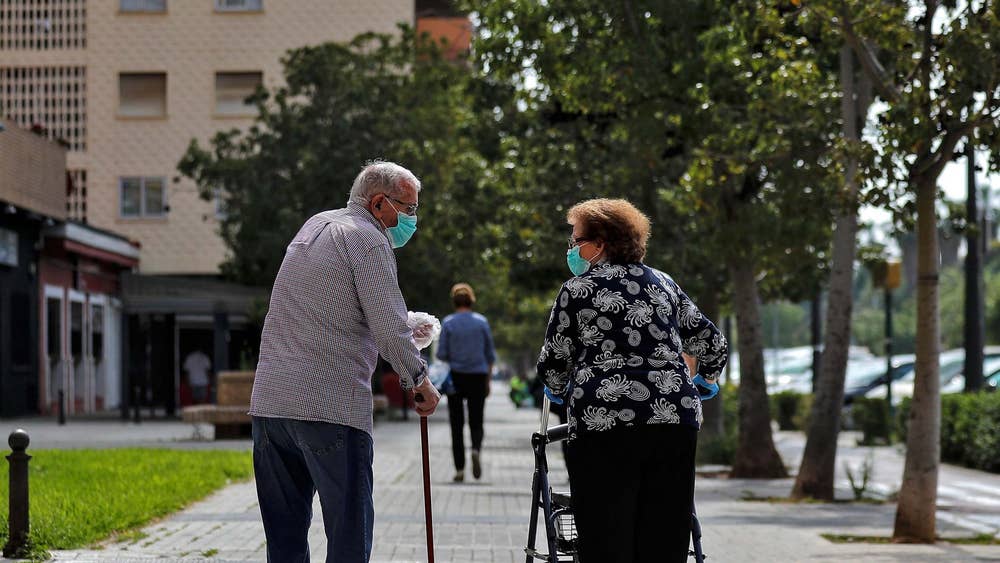

1/19
Two elderly people chat on a street in Valencia, Spain on 4 May
EPA

2/19
People look at the city from Villa Borghese park in Rome during the first day of Italy’s next phase in its coronavirus lockdown
Getty Images
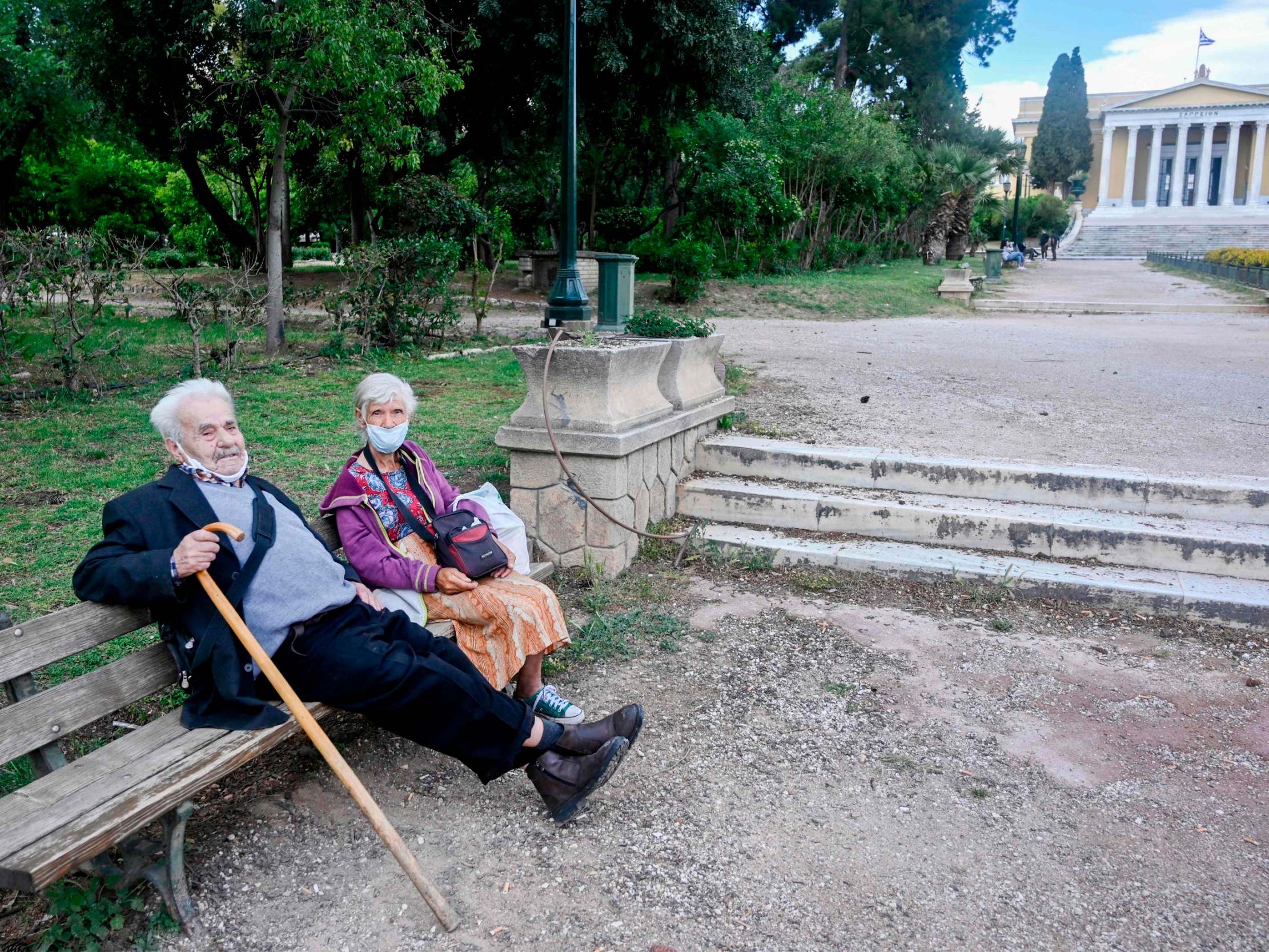
3/19
An elderly couple who has not been outside for nearly two months enjoys the weather as they sit on a bench in a park in Athens on 4 May
AFP via Getty Images
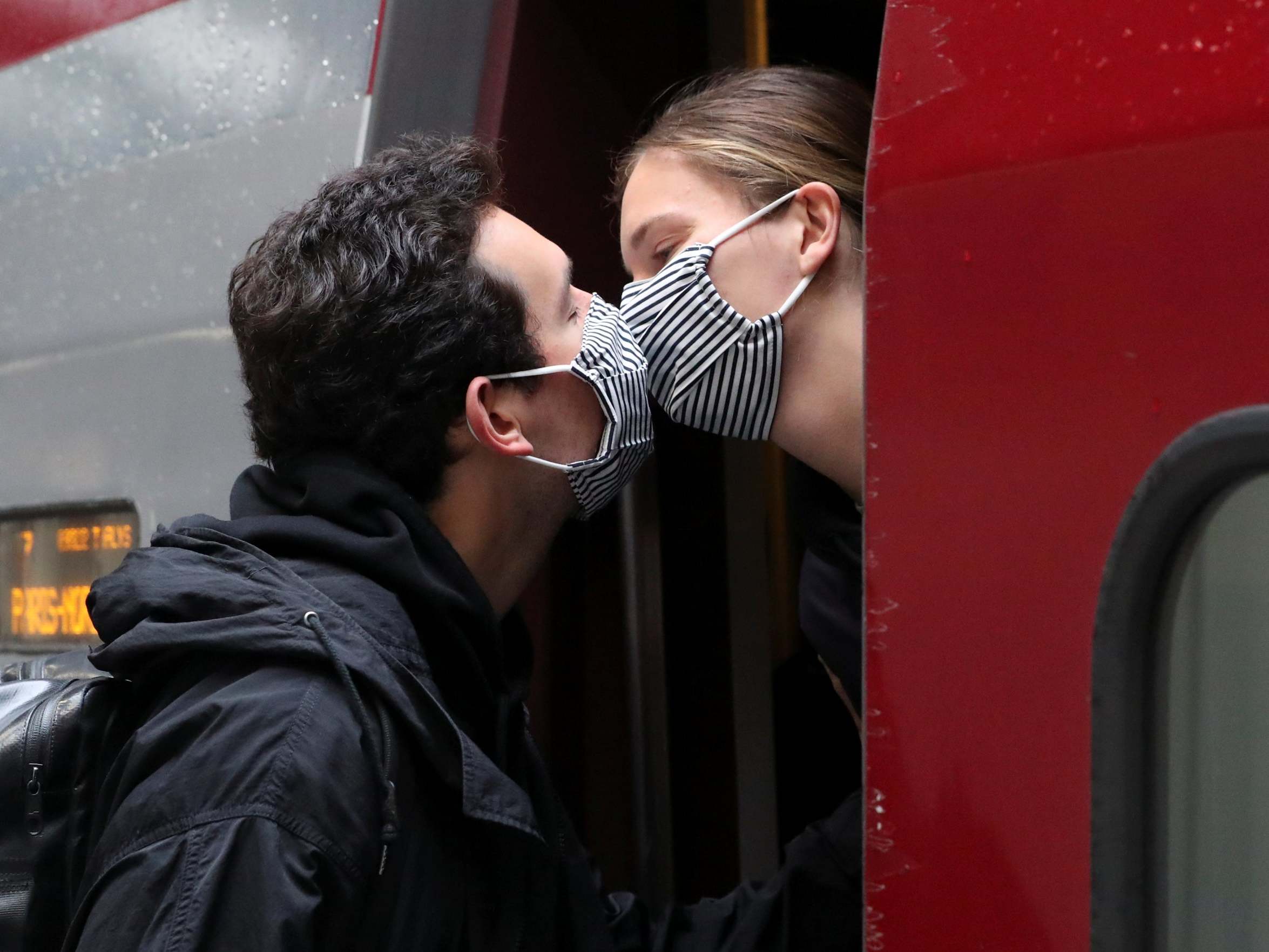
4/19
Henri de Chassey, wearing a protective face mask, kisses his partner Margaux Rebois, who is returning to Paris after spending two months in Brussels on 4 May
REUTERS
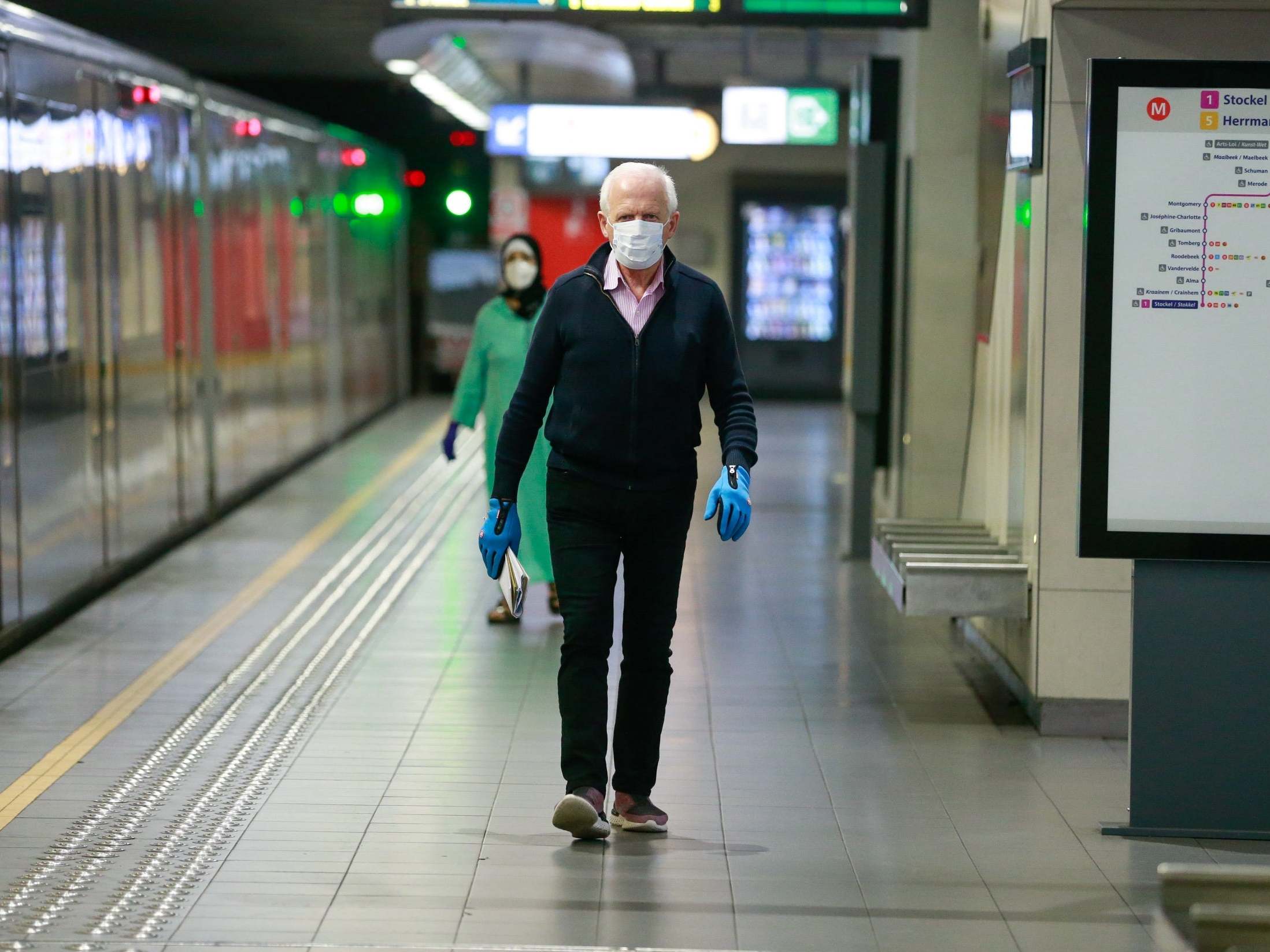
5/19
A commuter in protective mask wears gloves at an underground station in Brussels as some companies are allowed to bring workers back to the office
EPA/STEPHANIE LECOCQ

6/19
Paralympic swimmer Inigo Llopis prepares to swim in San Sebastian, Spain, for the first time since the lockdown began
Getty Images
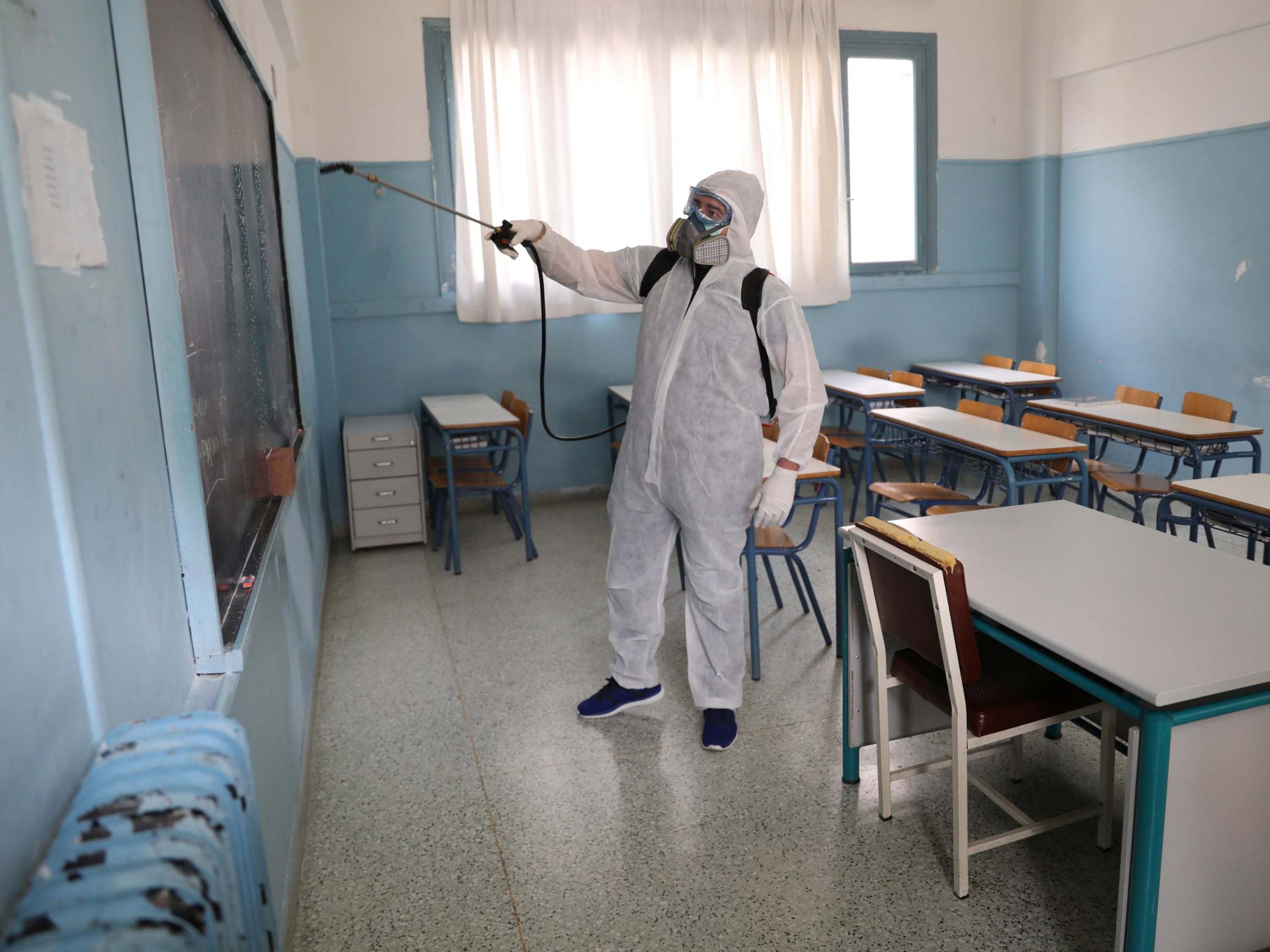
7/19
A worker wearing personal protective equipment disinfects a school in Athens as Greece relaxes its nationwide lockdown
REUTERS

8/19
A Spanish National Police officer distributes protective masks in Melilla, Spain, on 4 May
EPA
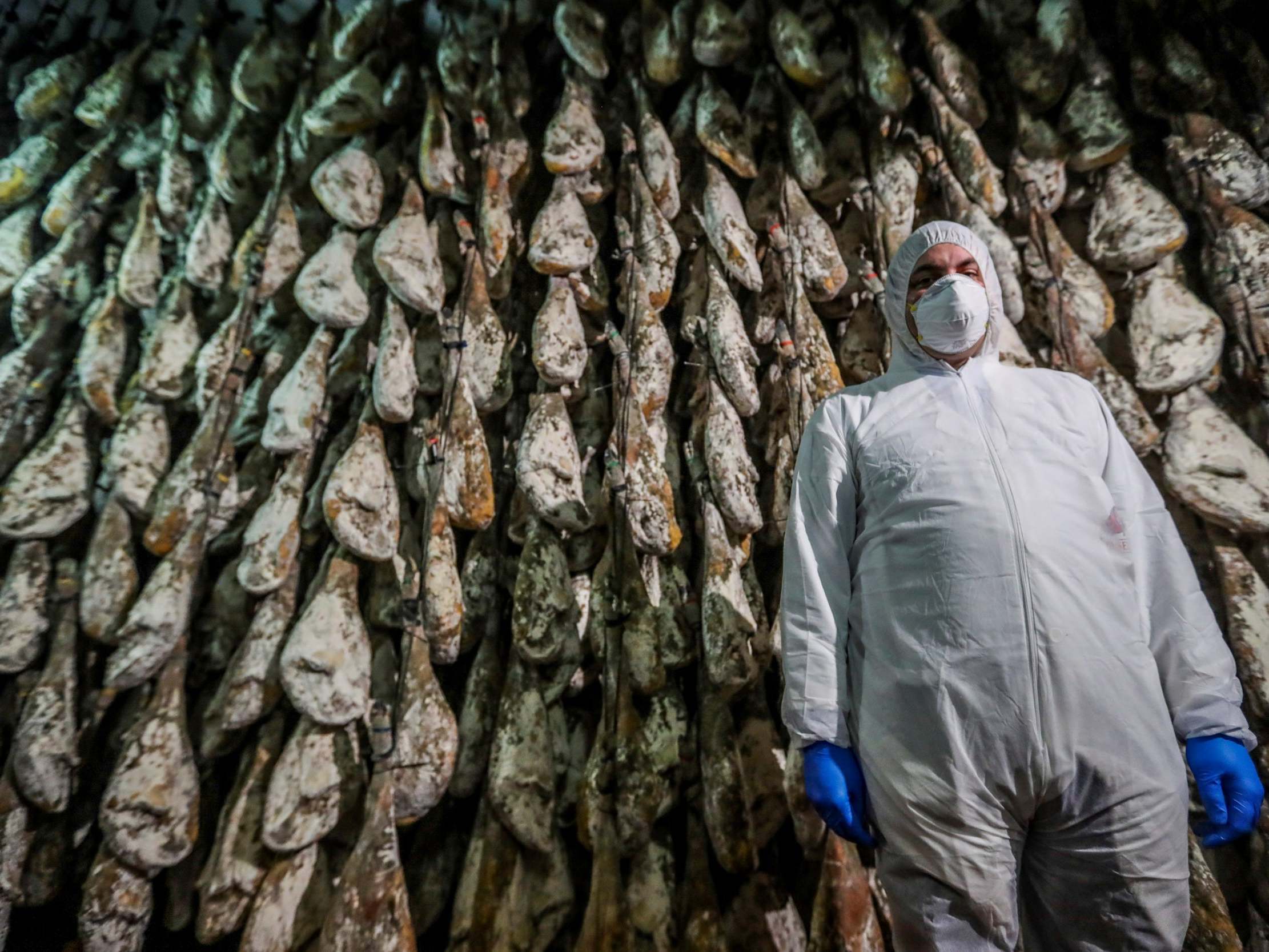
9/19
An employee poses in front of halfway-cured hams in a factory in Guijuelo, Salamanca, Spain, on 4 May
EPA

10/19
Workers in protective suits disinfect a high school in Athens as Greece moves to reopen schools for final-year students on 11 May
EPA

11/19
A worker disinfects a bus as transport vehicles are disinfected several times a day as part of Belgium’s lockdown exit strategy
Belga/AFP via Getty Images

12/19
A worker from Textilia haberdashery in Brussels holds a fabric that can be used to make customised protective face masks as Belgium relaxes its lockdown measures
REUTERS/Yves Herman

13/19
A bride tries on a wedding dress at a bridal shop in Madrid on the first day that some small businesses are allowed to open during Spain’s lockdown
REUTERS

14/19
People walk across the Galleria Vittorio Emanuele II shopping mall in central Milan as Italy eases its lockdown
AFP via Getty Images

15/19
A couple kiss in the Duomo Square in Catania as Italy starts moving out of its lockdown
Reuters

16/19
Mirel Chetan organises the books of the Antonio Machado bookstore in Madrid after 51 days of closure
Carlos Alvarez/Getty Images

17/19
A couple kiss in front of the sea in Catania as Italy begins a staged end to a nationwide lockdown due to the spread of the coronavirus disease
ANTONIO PARRINELLO/ REUTERS

18/19
A waiter at Caffe Cracco handles takeaway coffee in Milan on 4 May as Italy starts to ease its lockdown
Miguel Medina/AFP via Getty Images

19/19
A woman holds a yoga posture as she exercises by the Colosseum monument in Rome on the first day of Italy relaxing its lockdown measures
VINCENZO PINTO/AFP via Getty Images

1/19
Two elderly people chat on a street in Valencia, Spain on 4 May
EPA

2/19
People look at the city from Villa Borghese park in Rome during the first day of Italy’s next phase in its coronavirus lockdown
Getty Images

3/19
An elderly couple who has not been outside for nearly two months enjoys the weather as they sit on a bench in a park in Athens on 4 May
AFP via Getty Images

4/19
Henri de Chassey, wearing a protective face mask, kisses his partner Margaux Rebois, who is returning to Paris after spending two months in Brussels on 4 May
REUTERS

5/19
A commuter in protective mask wears gloves at an underground station in Brussels as some companies are allowed to bring workers back to the office
EPA/STEPHANIE LECOCQ

6/19
Paralympic swimmer Inigo Llopis prepares to swim in San Sebastian, Spain, for the first time since the lockdown began
Getty Images

7/19
A worker wearing personal protective equipment disinfects a school in Athens as Greece relaxes its nationwide lockdown
REUTERS

8/19
A Spanish National Police officer distributes protective masks in Melilla, Spain, on 4 May
EPA

9/19
An employee poses in front of halfway-cured hams in a factory in Guijuelo, Salamanca, Spain, on 4 May
EPA

10/19
Workers in protective suits disinfect a high school in Athens as Greece moves to reopen schools for final-year students on 11 May
EPA

11/19
A worker disinfects a bus as transport vehicles are disinfected several times a day as part of Belgium’s lockdown exit strategy
Belga/AFP via Getty Images

12/19
A worker from Textilia haberdashery in Brussels holds a fabric that can be used to make customised protective face masks as Belgium relaxes its lockdown measures
REUTERS/Yves Herman

13/19
A bride tries on a wedding dress at a bridal shop in Madrid on the first day that some small businesses are allowed to open during Spain’s lockdown
REUTERS

14/19
People walk across the Galleria Vittorio Emanuele II shopping mall in central Milan as Italy eases its lockdown
AFP via Getty Images

15/19
A couple kiss in the Duomo Square in Catania as Italy starts moving out of its lockdown
Reuters

16/19
Mirel Chetan organises the books of the Antonio Machado bookstore in Madrid after 51 days of closure
Carlos Alvarez/Getty Images

17/19
A couple kiss in front of the sea in Catania as Italy begins a staged end to a nationwide lockdown due to the spread of the coronavirus disease
ANTONIO PARRINELLO/ REUTERS

18/19
A waiter at Caffe Cracco handles takeaway coffee in Milan on 4 May as Italy starts to ease its lockdown
Miguel Medina/AFP via Getty Images

19/19
A woman holds a yoga posture as she exercises by the Colosseum monument in Rome on the first day of Italy relaxing its lockdown measures
VINCENZO PINTO/AFP via Getty Images
Counterfactual histories are a bit of a mug’s game. But had Michael Gove not decided, in 2016, that Johnson was unfit to be prime minister (before re-re-changing his mind again rather more recently), it’s not too much of a leap to think that there would have been a snap election, no hung parliament, no Corbyn, and he’d have had Starmer to worry about at a rather earlier stage in the Brexit process.
He would also, as it happens, be staring down the barrel of a coronavirus election.
That Johnson has a functioning opposition to worry about will be useful for pundits. But many such pundits also have a long enough memory to recall William Hague terrifying Tony Blair at prime minister’s questions for several years. The evidence would suggest it did not appear to make a huge amount of difference to the voters.
Still, it is commonly agreed that Blair’s comfortable 2001 victory on a low turnout with a strong economy was evidence of the politics of contentment.
The year 2024 is a long way off, but it is probably already early enough to forecast that particular emotion will still be in short supply by then.



